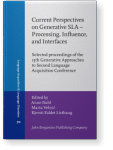Chapter 3
Complements and adjuncts of one in L2 English noun drop
This study examines the constraint against complements of the pro-form one in L2 English of Spanish native speakers. Complements (*The belief in Santa is greater than the one in Elvis) are disallowed, in contrast to adjuncts (The vase in the bedroom is nicer than the one in the kitchen). Spanish exhibits opposite tendencies in noun ellipsis: complements are productive but adjuncts are often restricted. Advanced Spanish learners performed as well as native speakers for most relevant properties but there was a tendency to accept complements to a greater extent than the English L1 speakers. However, 7/15 participants performed in a native-like manner, evidence that learners are capable of overcoming L1 effects in spite of the relative infrequency of relevant contexts.
Article outline
- 1.Introduction
- 2.The syntax of noun drop in Spanish and English: What learners have to acquire
- 3.Methodology
- 3.1Participants
- 3.2Materials
- 3.3Procedures
- 4.Group results
- 4.1Production task
- 4.2Felicity judgement task
- 4.3Grammaticality judgement task
- 5.Individual results for the contrast between complements and adjuncts of the pro-form ‘one’
- 6.Discussion
-
Notes
-
References
-
Appendix
This content is being prepared for publication; it may be subject to changes.
